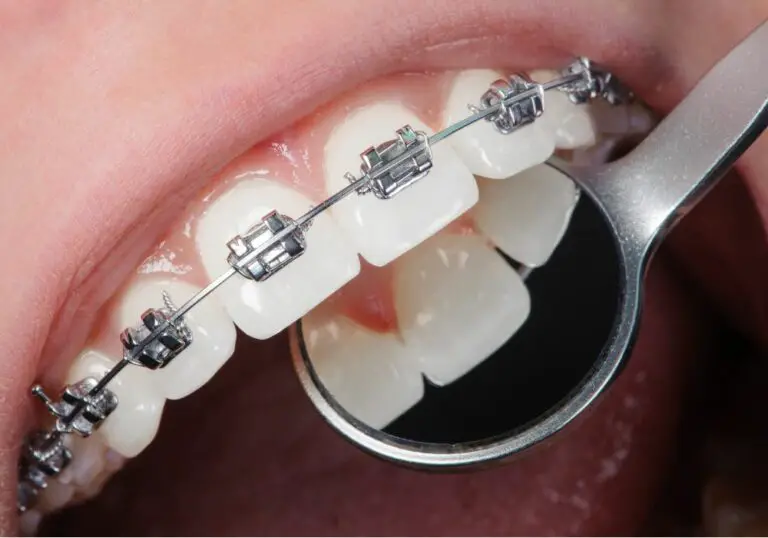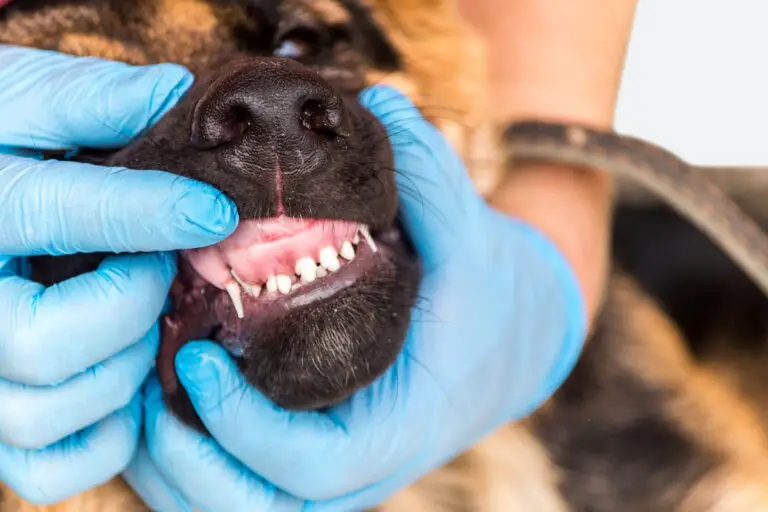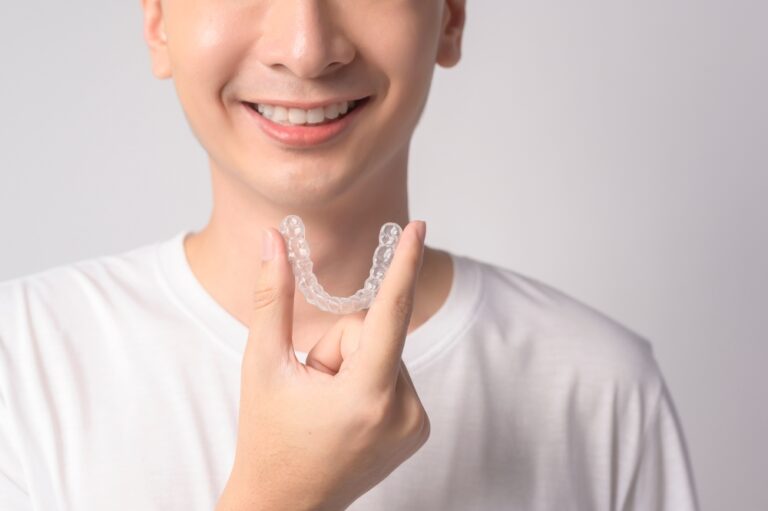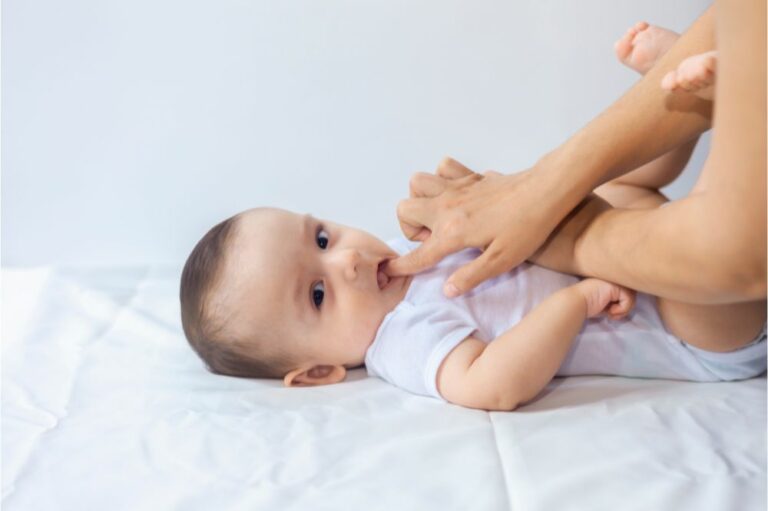Understanding Puppy Teething
Puppies begin teething around 3-4 months of age as their adult teeth start pushing through the gums while their puppy teeth fall out. The teething process lasts until a puppy is about 6-7 months old. This is a sensitive time as the gums become inflamed and irritated. Some minor bleeding may occur which is normal, but excessive bleeding can indicate a problem needing veterinary attention.
Puppy Teething Stages
Puppy teething happens in stages:
- Deciduous teeth: The “baby” or milk teeth start coming in at 2-4 weeks of age. Puppies have a full set of 28 deciduous teeth by 6-8 weeks old.
- Permanent teeth: The larger 42 permanent adult teeth begin emerging around 12-16 weeks as the puppy teeth loosen. The incisors and canines come in first followed by premolars and molars.
- Teething complete: By 5-7 months old, all adult teeth have erupted and puppy teething is complete. The gums, jaws and teeth go through major changes during this time.
Teething Symptoms
Puppies may exhibit both physical and behavioral symptoms while teething including:
- Swollen, inflamed gums
- Red, bleeding gums when chewing or brushing
- Loose puppy teeth
- Loss of appetite or difficulty eating
- Increased chewing behaviors
- Mouthing and biting at hands, toys, furniture
- Whining, crying and acting fussy
- Drooling due to discomfort
Providing chew toys and softened foods can help relieve puppy teething pain and discomfort. While mild gum bleeding is expected, excessive bleeding needs veterinary attention.
Why Do Puppy Teeth Bleed When Brushing?
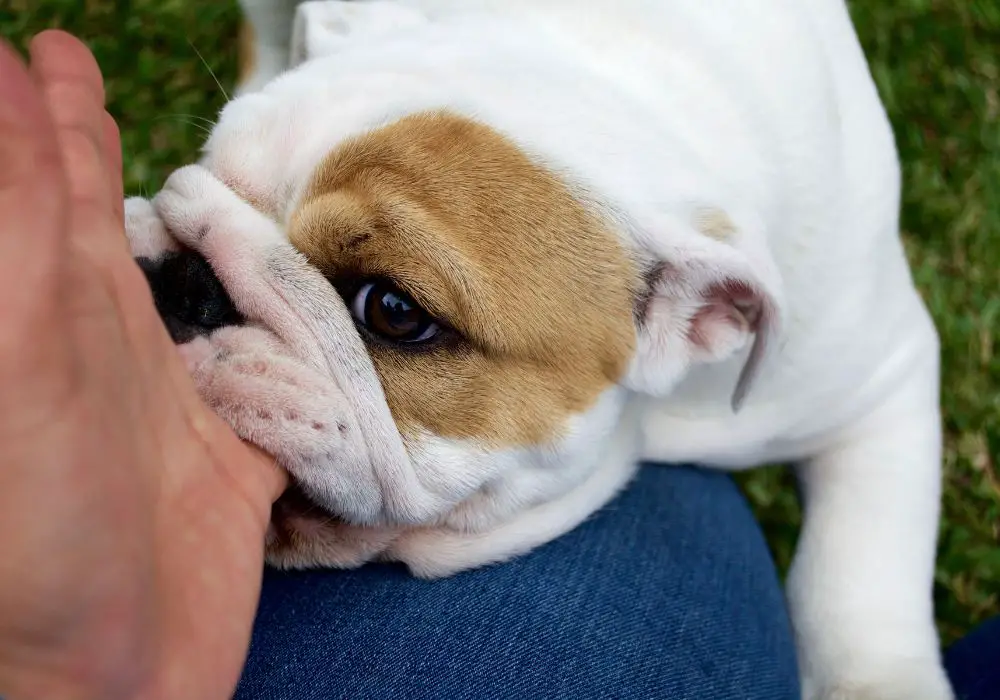
There are several reasons why brushing may cause puppy’s teeth to bleed during the teething process:
Gum Inflammation and Irritation
The gums become very irritated as new teeth erupt. Even gentle brushing can cause sore, swollen gums to bleed because they are hypersensitive.
Loose Deciduous Teeth
As adult teeth emerge, the roots of puppy teeth begin to dissolve and the teeth loosen. The loose teeth and gums surrounding them are prone to bleeding when disturbed.
Buildup of Plaque and Tartar
Puppies have underdeveloped enamel making their teeth very porous. Food and bacteria easily stick, causing inflamed gums and bleeding.
Permanent Teeth Pushing Through
The sharp points of erupting permanent teeth poke through the gums causing pain and bleeding as brushing further agitates the area.
Periodontal Disease
Gum disease is common in puppies. Brushing infected, damaged gums leads to more bleeding and exposure of bacteria.
Injury or Trauma
Any injury to the mouth, such as a scratched gum from a foreign object, can cause significant bleeding during brushing.
Clotting Disorder
Medical conditions like hemophilia and Von Willebrand disease prevent blood from clotting normally, resulting in excess bleeding.
Is Bleeding Normal When Brushing Puppy Teeth?
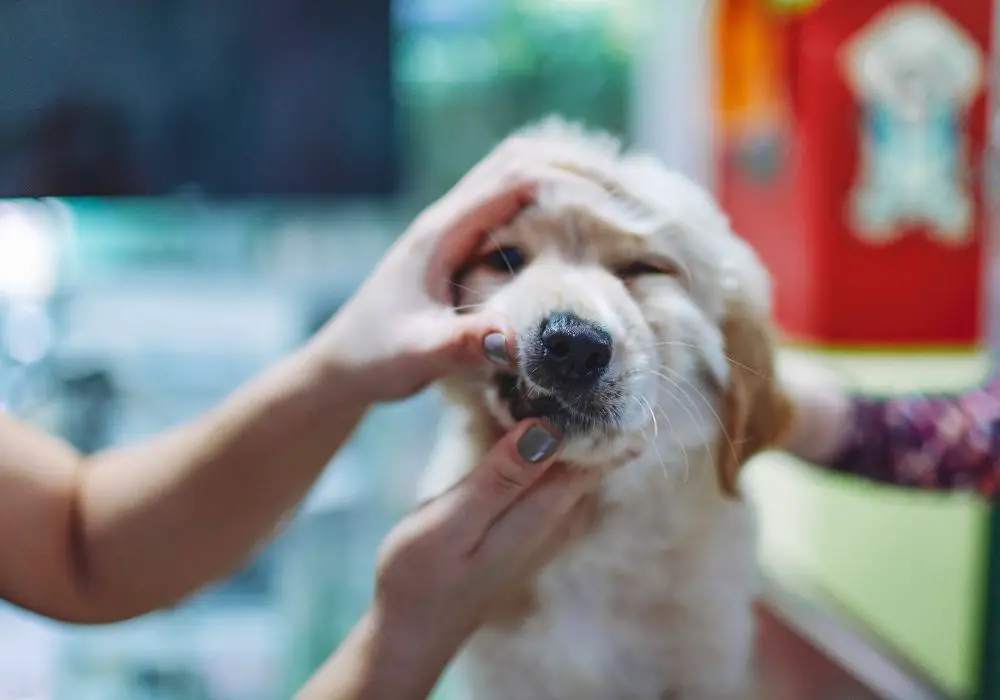
Mild gum bleeding can be expected when brushing puppy teeth during the teething process. However, heavy bleeding is not normal and may require veterinary help.
What is Considered Normal Bleeding
A small amount of blood on the brush or toothpaste after gently brushing inflamed gums is often normal for a teething puppy. Bleeding should stop within 1-2 minutes once brushing stops.
What is Considered Excessive Bleeding
Heavier bleeding that continues for several minutes or covers the brush and mouth in blood is considered abnormal. Bleeding unrelated to brushing also warrants concern.
When to See the Veterinarian
Seek veterinary help if puppy’s gums bleed excessively during or after brushing. Also consult a vet if bleeding does not clot or resolve within 2 minutes or if other symptoms are present like lethargy, facial swelling, appetite loss, or vomiting. Underlying issues need diagnosis.
How to Care for a Puppy’s Bleeding Gums

Caring for a puppy with sore, bleeding gums involves being very gentle, monitoring their health and limiting oral irritation. Here are some helpful tips:
Brush Gently
Use only ultra-soft brushes and brush with light, circular motions to clean teeth without damaging gums. Avoid scrubbing hard.
Rinse with Cool Water
Gently rinsing bleeding gums with cool water can act as an astringent, constricting blood vessels to reduce further bleeding.
Apply Light Pressure
Use a clean gauze or cloth to apply very gentle pressure to bleeding gums for 2-3 minutes which helps promote clotting.
Avoid Hard Chews and Toys
Prevent further trauma to sore mouths by avoiding extremely hard chew items. Opt for softer dental treats and toys designed to soothe teething pain.
Monitor for Abnormal Symptoms
Watch for facial swelling, pus, loose teeth, changes in eating and energy level which may indicate an underlying dental issue needs veterinary attention.
Allow Time for Healing
Be patient and allow 7-10 days after noticeable gum irritation for healing before attempting to brush sensitive areas again.
See the Veterinarian
Schedule an exam if bleeding is excessive or puppy seems very uncomfortable. Medication or tooth extraction may be required for gum disease.
How to Prevent Bleeding When Brushing Puppy Teeth
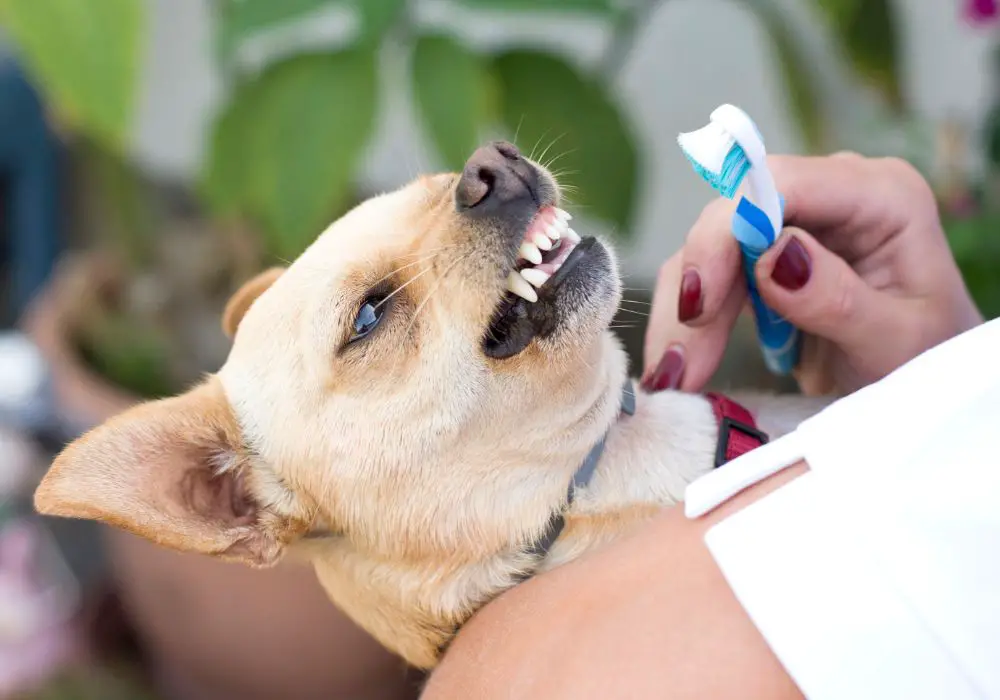
You can help prevent your teething puppy’s gums from bleeding excessively when brushing by:
Brushing Regularly
Gently brushing teeth 2-3 times per week gets puppy used to the routine and prevents heavy plaque and tartar buildup that irritates gums.
Using Ultra-Soft Brushes
Choose toothbrushes labeled specifically for puppies that have extra-soft bristles such as finger brushes or silicone brushes.
Monitoring Brushing Pressure
Apply only light pressure with brush bristles just touching the teeth and gums, avoiding scrubbing and irritation.
Scheduling Professional Cleanings
Arrange for regular professional dental cleanings during teething to remove plaque below the gumline.
Providing Appropriate Chew Toys
Give puppy safe, soft rubber teething toys to help soothe mouth pain and redirect chewing urges.
Selecting High Quality Dental Treats
Offer reputable dental treats made to scrape away plaque without hard crunching that can damage gums.
Feeding Dental Diet Kibble
Choose veterinary formulated dry food designed to scrub teeth clean as puppy chews and promote healthy gums.
With a gentle brushing routine, professional cleanings, and teething relief, you can keep your puppy’s mouth healthy and minimize bleeding on the path to adult teeth!
Frequently Asked Questions
Why are my puppy’s gums bleeding even though I’m brushing very gently?
The inflammation and irritation associated with teething makes puppy gums extremely tender and prone to bleeding, even with the most gentle brushing. Focus on brushing areas without emerging or loose teeth. Bleeding should decrease after teething is complete around 5-7 months.
My puppy’s gums are bleeding when eating or chewing toys. What should I do?
Bleeding while chewing or eating soft food is common during teething as the gums are irritated. Provide frozen carrots or yogurt for discomfort. Avoid very hard toys that can damage tender gums. Check for any foreign objects lodged in the gums as well.
When should puppy gum bleeding during brushing stop?
Bleeding and gum sensitivity should improve significantly around 6-7 months of age once all adult teeth have erupted. If bleeding continues past teething, have your vet evaluate for periodontal disease, clotting disorders or injury.
Can I just use an oral rinse instead of brushing when my puppy’s gums are bleeding?
While oral rinses can be beneficial, brushing is most effective for plaque removal. Use an ultra-soft brush with gentle, circular motions. Avoid hydrogen peroxide rinses which can further irritate inflamed gums.
What age should you start brushing a puppy’s teeth?
Veterinarians recommend starting to gently rub a puppy’s teeth and gums using your finger or a soft washcloth as early as 2-4 weeks old. This gets them used to tooth brushing. You can introduce toothpaste and a finger brush at 8-12 weeks.

